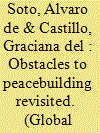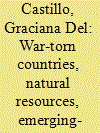| Srl | Item |
| 1 |
ID:
145066


|
|
|
|
|
| Summary/Abstract |
In January 1992, the economic program sponsored by the International Monetary Fund in El Salvador sacrificed the government's ability to implement the UN-mediated peace agreement on the altar of budgetary discipline and placed the country at the brink of relapsing into war. This episode turned the spotlight on a major obstacle to peacebuilding: the UN and the Bretton Woods Institutions, which frequently work elbow-to-elbow where war-torn countries struggle to move to peace, are all too often at odds and even on a collision course. This article analyzes the UN record since then; assesses whether institutional changes have improved or hindered UN capacity to support countries in overcoming such obstacles; and makes proposals for moving forward in a more effective, coherent, and coordinated way.
|
|
|
|
|
|
|
|
|
|
|
|
|
|
|
|
| 2 |
ID:
136059


|
|
|
|
|
| Summary/Abstract |
The unsustainable aid dependency of war-torn countries – most of which are rich in natural resources – makes it imperative to start gradually replacing aid with foreign direct investment (fdi) and exports. This article identifies ways in which stakeholders – governments, the international community, including the UN development system, foreign investors, and local communities – could work together in a ‘win-win’ situation. Most crucial is avoiding conflict-insensitive policies that fuel discord by putting governments and foreign companies, often from emerging markets, in direct confrontation with local communities. The control of natural resources is often a root cause of conflict, and the latter’s exploitation can become a major challenge as wars end. The peculiarities of war-torn countries are discussed along with the specific impediments to attracting fdi into the exploitation of natural resources. An effective and fair legal framework is necessary to ensure that investors do not operate as ‘enclaves’, creating new conflicts.
|
|
|
|
|
|
|
|
|
|
|
|
|
|
|
|